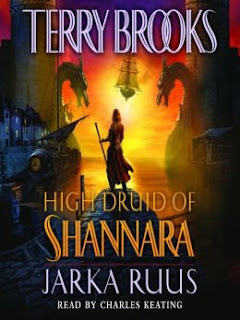2011; 206 pages. New Author? : No. Genre : Dark Humor. Overall Rating : 7*/10.
Ruckus
and Fred sure are a couple of guys who like to live life on the wild side. For a good time they drive over to the used-book store and then to the Dairy
Queen for ice cream.
Yeah, I know, that doesn’t
exactly make you hear “Born To Be Wild”
as background music. But Fred and Ruckus are both inmates at the Shady Grove Home for the
Mentally Insane, and leaving the premises is a major no-no.
To boot, their choice of wheels is a ’69
Mustang convertible, which belongs to Mr. Otis, one of the caretakers at Shady
Rest. And when he’s neck deep in triple
tequila peach lime smoothies, he’s in no condition to tell whether anyone is
joyriding around in his automobile. So
while Mr. Otis is snoozing, the boys can go cruising.
But
when one of the female inmates horns her way in on the action, you can bet it’s
gonna lead to trouble, Especially since she’s got an agenda of revenge.
What’s To Like...
Driving Me Nuts is a fast and easy read. The
action starts immediately, and continues throughout the whole book. For the most part, we see things from
Ruckus’s POV, with Fred and Apple (the female femme fatale) also getting
prominent ink. There
aren’t a lot of other characters to keep track of, but they're an interesting bunch, especially Preacher and Mama Louise.
Except for the Epilogue, the entire storyline consists of a single
night of avenging antics, as Apple squares things away with a number of tormentors from
her past. Fred is little more than a
drooling puppy, so it is up to Ruckus to somehow get the threesome, and the ’69
Mustang convertible, back to Shady Grove in one piece and with no one the
wiser. Yeah, like that has any chance of happening.
This is my third P.J. Jones book; the other two are reviewed here and here. Of the three, I liked
this one the best. The tone is darker
here, and at just over 200 pages, it is the longest book I’ve read by this author,
with the most complex storyline of the three.
For me, it was a “broadening” of Ms. Jones’ literary repertoire, even
though it predates the other two books.
There is a lot of cussing, and a bunch of unsavory and/or adult topics such as child
molestation, rape, oral sex, jerking off, and erections. If these offend you, you would be
well-advised to stay away from Driving Me Nuts. or any of P.J. Jones’s stories for that matter. It is her natural genre to write in an R-rated manner. To do differently would be akin to asking Allen Ginsberg to only
write G-rated poems.
There is a way-kewl Author’s Note at the front of the book. Despite the multitude of mayhem, the ending
ties everything up in a relatively happy manner. This is a standalone novel; AFAIK, P.J. Jones
has not written any series. Some of us
think that’s a plus.
Excerpts...
Mr. Otis didn’t
always break the rules. Lights out at
nine-thirty. That was one rule Ruckus
wished he would bend. No pissing on
lunch trays. That was another rule.
One of Ruckus’s
biggest pet peeves was inconsistency.
Either break all the rules or none at all. People and their ‘socially acceptable
behavior’ bothered him. (loc.
69)
“Are you sure
you’re not my dad?”
“Fred,” Ruckus
grumbled. “Your dad has your green
eyes. Garth Vader has brown eyes.”
Vader
straightened his bony shoulders and puffed up his chest. “Do you find fault with my anatomy?”
“Brown is nice,”
Fred interjected. “Brown is the color of
tree branches.”
Vader
nodded. “And the stain in my
intergalactic underpants.” (loc.
1022)
Kindle Details...
Driving
Me Nuts sells for $2.99 at Amazon. P.J. Jones has a number of other books
available for the Kindle, ranging from $0.99 to $3.99. She is also part of “The Eclective”, a group
of short story writers, and many of their anthology offerings are free.
“I don’t recall proliferating any life forms on this planet.” (loc. 1022)
There
are some minor quibbles. I thought there
were a couple sections that could've been strengthened by "showing” instead of “telling”.
And the writing style might best be described as “very
straightforward”. Some additional
polishing would’ve made this a really delightful read.
But,
as with the R-rated stuff, this is all inherent to the author’s writing
style. The added polishing and showing
would be technical improvements, but perhaps in the end, it just wouldn’t be
the real P.J.
7 Stars. Don’t let the quibbles dissuade you from
reading Driving Me Nuts. The bottom line
is that I found it to be fast-paced, both dark and funny (a somewhat dicey combination of genres), and
the most ambitious literary effort yet that I’ve read by P.J. Jones.








